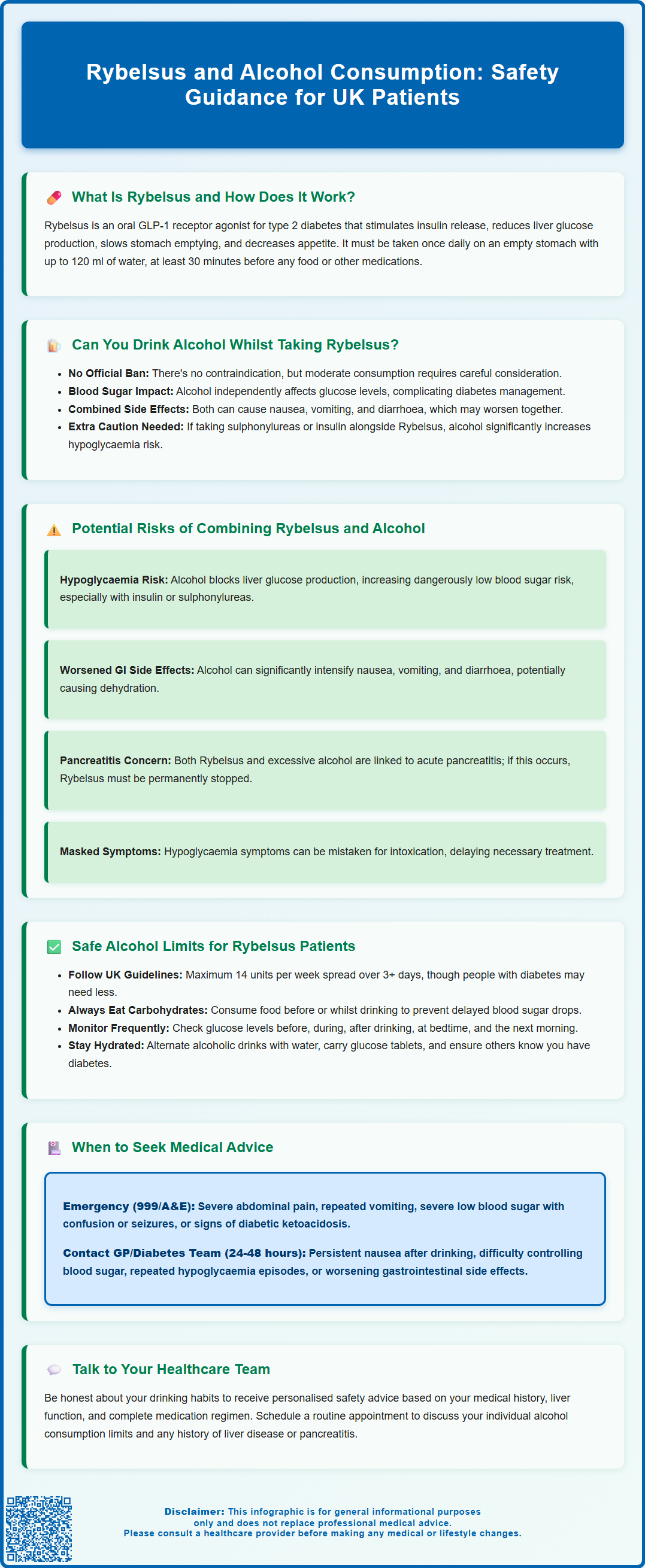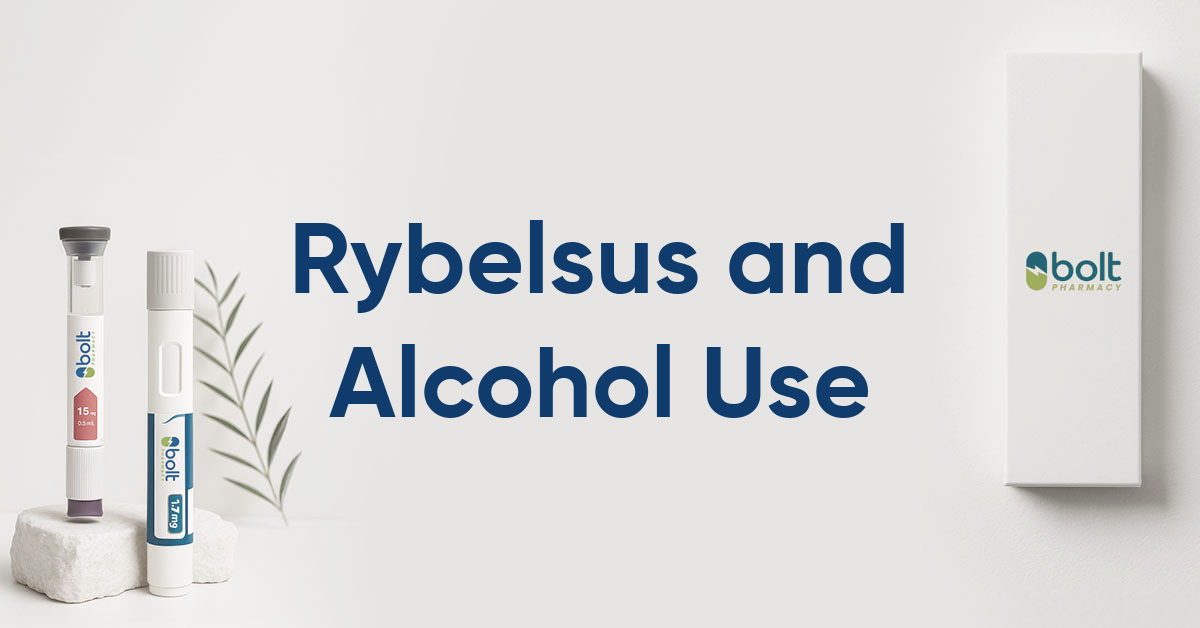Rybelsus (semaglutide) is an oral GLP-1 receptor agonist licensed in the UK for managing type 2 diabetes mellitus in adults. Many patients wonder whether it is safe to consume alcohol whilst taking this medication. Whilst there is no absolute contraindication to drinking alcohol on Rybelsus, the combination requires careful consideration. Both alcohol and Rybelsus can affect blood glucose levels and gastrointestinal function, potentially increasing risks such as hypoglycaemia and worsening side effects like nausea. This article examines the evidence, potential risks, and practical guidance for patients taking Rybelsus who wish to consume alcohol, helping you make informed decisions about your diabetes management.
Summary: Moderate alcohol consumption is not strictly prohibited with Rybelsus, but both substances affect blood glucose and gastrointestinal function, requiring careful monitoring and adherence to UK low-risk drinking guidelines.
- Rybelsus is an oral GLP-1 receptor agonist that improves glycaemic control by stimulating insulin secretion, suppressing glucagon, and slowing gastric emptying.
- Alcohol can cause hypoglycaemia or hyperglycaemia independently and may worsen Rybelsus side effects such as nausea, vomiting, and abdominal discomfort.
- Patients taking Rybelsus with sulphonylureas or insulin face significantly increased hypoglycaemia risk when consuming alcohol.
- UK guidance recommends no more than 14 units of alcohol weekly, spread over three or more days, with alcohol consumed alongside food to stabilise blood glucose.
- Seek immediate medical attention for severe abdominal pain, repeated vomiting, or signs of severe hypoglycaemia whilst taking Rybelsus and consuming alcohol.
Table of Contents
What Is Rybelsus and How Does It Work?
Rybelsus (semaglutide) is an oral medication licensed in the UK for the treatment of type 2 diabetes mellitus in adults. It belongs to a class of drugs known as glucagon-like peptide-1 (GLP-1) receptor agonists. Rybelsus is typically prescribed alongside diet and exercise modifications to improve glycaemic control when other treatments have not achieved adequate blood glucose management.
The mechanism of action of Rybelsus involves mimicking the naturally occurring hormone GLP-1, which plays several important roles in glucose regulation. When you take Rybelsus, it:
-
Stimulates insulin secretion from pancreatic beta cells in a glucose-dependent manner, meaning insulin is released only when blood glucose levels are elevated
-
Suppresses glucagon release, reducing the amount of glucose produced by the liver
-
Slows gastric emptying, which helps moderate the rise in blood glucose after meals
-
Reduces appetite, which may contribute to weight loss in some patients
Rybelsus is available in three tablet strengths (3 mg, 7 mg, and 14 mg) and must be taken once daily on an empty stomach with up to 120 ml of water. The tablet should be swallowed whole at least 30 minutes before the first food, drink, or other oral medicines of the day. This specific administration requirement is crucial for optimal absorption, as the bioavailability of oral semaglutide is relatively low compared to injectable formulations.
Treatment typically starts with 3 mg once daily for 30 days, then increases to 7 mg once daily. If additional glycaemic control is needed after at least 30 days on the 7 mg dose, the dose may be increased to 14 mg once daily.
The medication has been shown in clinical trials to effectively reduce HbA1c levels and may also support modest weight reduction, though it is not licensed for weight management. According to NICE guidance (NG28), GLP-1 receptor agonists like Rybelsus may be recommended as part of triple therapy or when insulin is not appropriate, typically in patients with specific BMI thresholds or weight-related concerns.
Importantly, Rybelsus is not indicated for treatment of type 1 diabetes or diabetic ketoacidosis, and caution is advised in patients with severe gastrointestinal disease.

Can You Drink Alcohol While Taking Rybelsus?
There is no official contraindication to consuming alcohol whilst taking Rybelsus, and the medication's Summary of Product Characteristics (SmPC) does not list alcohol as a specific interaction. This means that moderate alcohol consumption is not strictly prohibited for patients prescribed this medication. However, this does not mean that combining Rybelsus and alcohol is without considerations or potential risks.
It is important to understand that alcohol itself can affect blood glucose levels independently of any diabetes medication. Alcohol can cause both hypoglycaemia (low blood sugar) and hyperglycaemia (high blood sugar), depending on various factors including the amount consumed, whether food is eaten alongside it, and individual metabolic responses. For people with type 2 diabetes, managing blood glucose stability is paramount, and alcohol introduces an additional variable that can complicate glycaemic control.
Whilst Rybelsus does not directly interact with alcohol at a pharmacological level, both substances affect the gastrointestinal system. Rybelsus commonly causes gastrointestinal adverse effects such as nausea, vomiting, diarrhoea, and abdominal discomfort, particularly when treatment is initiated or the dose is increased. Alcohol is also known to irritate the stomach lining and can exacerbate these symptoms.
If you are taking Rybelsus alongside a sulfonylurea (such as gliclazide) or insulin, you should be particularly cautious with alcohol, as the combination significantly increases hypoglycaemia risk. Discuss with your healthcare professional whether dose adjustments of these medications might be needed if you consume alcohol.
Patients taking Rybelsus should discuss their alcohol consumption habits openly with their GP or diabetes specialist nurse. Individual circumstances vary considerably, and factors such as overall diabetes control, presence of complications (particularly diabetic gastroparesis or pancreatitis history), other medications, and liver function all influence whether alcohol consumption is advisable. The key principle is informed, individualised decision-making rather than blanket prohibition or unrestricted consumption.
Potential Risks of Combining Rybelsus and Alcohol
Combining Rybelsus with alcohol carries several potential risks that patients should understand, even though there is no direct pharmacological interaction between the two substances.
Increased risk of hypoglycaemia is perhaps the most clinically significant concern. Alcohol inhibits gluconeogenesis (the liver's production of glucose), which can lead to dangerously low blood sugar levels, particularly if consumed without adequate food. Whilst Rybelsus itself has a low intrinsic risk of hypoglycaemia when used as monotherapy, many patients take it alongside other diabetes medications such as sulphonylureas or insulin, which do carry hypoglycaemia risk. The combination of these medications with alcohol substantially increases the likelihood of a hypoglycaemic episode. Symptoms of hypoglycaemia (confusion, sweating, tremor, altered consciousness) can also be mistaken for intoxication, potentially delaying appropriate treatment.
Gastrointestinal side effects represent another important consideration. The most common adverse reactions to Rybelsus according to the SmPC include:
-
Nausea (very common)
-
Vomiting (common)
-
Diarrhoea (common)
-
Abdominal pain (common)
-
Reduced appetite (common)
Alcohol consumption can significantly worsen these symptoms, making the medication less tolerable and potentially affecting adherence to treatment. Persistent vomiting or diarrhoea can lead to dehydration and potentially acute kidney injury, so maintaining adequate hydration is important.
Pancreatitis risk is a rare but serious concern with GLP-1 receptor agonists. Whilst the absolute risk remains low and a causal relationship has not been definitively established, both Rybelsus and excessive alcohol consumption are independently associated with acute pancreatitis. The SmPC advises that Rybelsus should be discontinued if pancreatitis is suspected and should not be restarted if pancreatitis is confirmed. Patients with a history of pancreatitis should exercise particular caution.
Additionally, alcohol can impair liver function over time, and since the liver plays a crucial role in glucose metabolism, chronic alcohol use may worsen overall diabetes control and complicate the management of type 2 diabetes beyond the immediate effects of Rybelsus. There is also an association between GLP-1 receptor agonists and gallbladder disease, which may be exacerbated by certain dietary patterns including alcohol consumption.
Safe Alcohol Limits for Rybelsus Patients
For patients taking Rybelsus, adhering to UK Chief Medical Officers' low-risk drinking guidelines is advisable. These recommend that both men and women should not regularly drink more than 14 units of alcohol per week, and these units should be spread over three or more days with several alcohol-free days each week. To put this in context, 14 units is roughly equivalent to six pints of average-strength (4%) beer or six medium (175ml) glasses of wine (13% ABV), though this varies with the alcohol content of different drinks.
However, people with diabetes may need to be more conservative than these general population guidelines. The following practical recommendations can help minimise risks:
-
Never drink on an empty stomach – always consume alcohol with or after a meal containing carbohydrates to help stabilise blood glucose levels
-
Monitor blood glucose more frequently when drinking alcohol, including before bed and the following morning, as delayed hypoglycaemia can occur several hours after consumption
-
Check your blood glucose before going to bed after drinking alcohol and consider having a carbohydrate snack if your levels are trending low to prevent nocturnal hypoglycaemia
-
Avoid binge drinking or saving up units – spreading alcohol intake and avoiding large quantities in a single session reduces the risk of severe hypoglycaemia
-
Stay well hydrated by alternating alcoholic drinks with water
-
Carry glucose tablets or a fast-acting carbohydrate source and ensure companions know you have diabetes and how to respond to hypoglycaemia
-
Wear medical identification indicating you have diabetes
It is worth noting that individual tolerance varies considerably. Factors such as body weight, liver function, kidney function, other medications, and overall diabetes control all influence how alcohol affects you. Some patients may find that even small amounts of alcohol cause problematic blood glucose fluctuations or worsen gastrointestinal symptoms from Rybelsus. If you experience adverse effects, it may be prudent to avoid alcohol entirely whilst taking this medication. Always prioritise your diabetes management and overall health over social drinking pressures.
When to Seek Medical Advice About Alcohol and Rybelsus
There are several circumstances in which you should contact your GP, diabetes specialist nurse, or seek urgent medical attention regarding alcohol consumption whilst taking Rybelsus.
Seek immediate medical help (call 999 or attend A&E) if you experience:
-
Severe, persistent abdominal pain, particularly if radiating to the back (potential pancreatitis) – stop taking Rybelsus immediately if pancreatitis is suspected
-
Repeated vomiting that prevents you from keeping down fluids or medications
-
Signs of severe hypoglycaemia (confusion, loss of consciousness, seizures)
-
Symptoms of diabetic ketoacidosis (excessive thirst, frequent urination, fruity breath odour, confusion) – though this is rare in type 2 diabetes patients on GLP-1 receptor agonists alone, it may occur if you are also taking SGLT2 inhibitors or insulin
Contact your GP, NHS 111, or diabetes care team within 24-48 hours if:
-
You experience persistent nausea or vomiting after drinking alcohol whilst on Rybelsus
-
Your blood glucose readings become consistently difficult to control after alcohol consumption
-
You notice a pattern of hypoglycaemia following drinking
-
Gastrointestinal side effects from Rybelsus worsen significantly when you consume alcohol
-
You have concerns about your alcohol consumption levels or feel you may be drinking more than is safe
Schedule a routine appointment to discuss:
-
Your individual alcohol consumption and whether it is appropriate given your diabetes control and other health conditions
-
Any history of alcohol-related problems, liver disease, or pancreatitis
-
Whether your current diabetes medication regimen (including Rybelsus and any other drugs) increases your risk when combined with alcohol
-
Strategies for social situations involving alcohol
Remember that honest communication with your healthcare team is essential for safe, effective diabetes management. Your clinicians can provide personalised advice based on your complete medical history, current medications, and individual risk factors. If you are struggling with alcohol consumption, support services such as your GP, local alcohol support services, or organisations like Drinkline (0300 123 1110) can provide confidential help and guidance.
If you experience any suspected side effects from Rybelsus, whether related to alcohol consumption or not, report them through the MHRA Yellow Card Scheme (yellowcard.mhra.gov.uk or via the Yellow Card app).
Frequently Asked Questions
Is it safe to drink alcohol whilst taking Rybelsus?
There is no absolute contraindication to drinking alcohol with Rybelsus, but both substances affect blood glucose levels and gastrointestinal function. Patients should adhere to UK low-risk drinking guidelines (maximum 14 units weekly) and always consume alcohol with food to reduce hypoglycaemia risk.
Can alcohol cause low blood sugar when taking Rybelsus?
Yes, alcohol inhibits the liver's glucose production and can cause hypoglycaemia, particularly when combined with Rybelsus and other diabetes medications such as sulphonylureas or insulin. Always monitor blood glucose levels before and after drinking alcohol.
What should I do if I experience side effects after drinking alcohol on Rybelsus?
Seek immediate medical help for severe abdominal pain, repeated vomiting, or signs of severe hypoglycaemia. Contact your GP or diabetes care team within 24-48 hours for persistent nausea, difficult-to-control blood glucose, or worsening gastrointestinal symptoms after alcohol consumption.
The health-related content published on this site is based on credible scientific sources and is periodically reviewed to ensure accuracy and relevance. Although we aim to reflect the most current medical knowledge, the material is meant for general education and awareness only.
The information on this site is not a substitute for professional medical advice. For any health concerns, please speak with a qualified medical professional. By using this information, you acknowledge responsibility for any decisions made and understand we are not liable for any consequences that may result.
Heading 1
Heading 2
Heading 3
Heading 4
Heading 5
Heading 6
Lorem ipsum dolor sit amet, consectetur adipiscing elit, sed do eiusmod tempor incididunt ut labore et dolore magna aliqua. Ut enim ad minim veniam, quis nostrud exercitation ullamco laboris nisi ut aliquip ex ea commodo consequat. Duis aute irure dolor in reprehenderit in voluptate velit esse cillum dolore eu fugiat nulla pariatur.
Block quote
Ordered list
- Item 1
- Item 2
- Item 3
Unordered list
- Item A
- Item B
- Item C
Bold text
Emphasis
Superscript
Subscript












